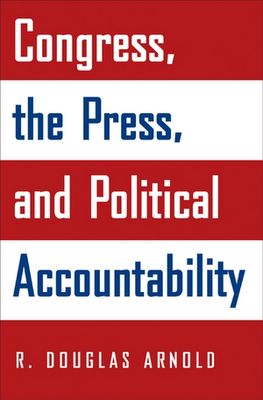Coisas que se devem ler e fazer:

Congress, the Press, and Political Accountability, R. Douglas Arnold

Congress, the Press, and Political Accountability, R. Douglas Arnold
This book differs from previous studies by exploring four sets of questions about the volume, content, causes, and consequences of newspaper coverage.
First, it seeks to establish how frequently local media outlets cover members of Congress. Do media outlets regularly report information about representatives' actions in office, and do they display their coverage in prominent ways? Or is coverage of representatives infrequent, spotty, or buried in the back pages of newspapers? It is important to determine something about the volume and prominence of political information because both factors affect whether citizens are likely to notice and digest the information.
Second, it examines the content of press coverage of individual legislators. Do the media report the kinds of information that citizens would need to hold representatives accountable for their actions in office, or do they focus on more peripheral matters that entertain, amuse, or enrage citizens without conveying much information about legislators' actual performance? Do they feature bill introductions, roll-call votes, leadership activities, and constituency service? Are the media evenhanded in their stories, or do they offer more extensive or more positive coverage to incumbents than to challengers, or to Democrats than to Republicans?
Third, it seeks to explain why news outlets differ in their coverage of Congress and its members. Why do some media outlets provide exemplary coverage of local representatives while others largely ignore representatives' activities? Do large, well-financed urban newspapers provide better coverage of representatives, or do these papers avoid extensive coverage of local representatives because their primary circulation areas include so many congressional districts? Does press coverage depend on what representatives do in Congress? Do local media outlets cover more extensively legislators who are important participants in congressional policy making--the workhorses--or do representatives attract local press attention by constituency-oriented activities? Does it matter whether media outlets have Washington correspondents?
Finally, it attempts to discover whether differential coverage of local representatives affects citizens' political knowledge. Are citizens who live in areas where media outlets carefully cover representatives more likely to recall or recognize their representatives than citizens who live in areas where media attention is sparse? Does media attention affect the chances that citizens will know something about representatives' records? When the media report extensive information about roll-call votes, are citizens more likely to know where their representative stands on the issues?"
Second, it examines the content of press coverage of individual legislators. Do the media report the kinds of information that citizens would need to hold representatives accountable for their actions in office, or do they focus on more peripheral matters that entertain, amuse, or enrage citizens without conveying much information about legislators' actual performance? Do they feature bill introductions, roll-call votes, leadership activities, and constituency service? Are the media evenhanded in their stories, or do they offer more extensive or more positive coverage to incumbents than to challengers, or to Democrats than to Republicans?
Third, it seeks to explain why news outlets differ in their coverage of Congress and its members. Why do some media outlets provide exemplary coverage of local representatives while others largely ignore representatives' activities? Do large, well-financed urban newspapers provide better coverage of representatives, or do these papers avoid extensive coverage of local representatives because their primary circulation areas include so many congressional districts? Does press coverage depend on what representatives do in Congress? Do local media outlets cover more extensively legislators who are important participants in congressional policy making--the workhorses--or do representatives attract local press attention by constituency-oriented activities? Does it matter whether media outlets have Washington correspondents?
Finally, it attempts to discover whether differential coverage of local representatives affects citizens' political knowledge. Are citizens who live in areas where media outlets carefully cover representatives more likely to recall or recognize their representatives than citizens who live in areas where media attention is sparse? Does media attention affect the chances that citizens will know something about representatives' records? When the media report extensive information about roll-call votes, are citizens more likely to know where their representative stands on the issues?"
5 comentários:
Nós por cá gostamos mesmo é da Contra-informação...
Até porque a coisa não se coloca em termos de Democratas e/ou Conservadores e Republicanos. Os partidos políticos são mais do que as mães, e os jornais não se vendem, honrosa excepção para os que se referem à bola.
Quanto à Accountability, estamos a milénios, é ver a banda passar e os milhões a rolar. Não se questiona, e quem o faz não obtém grande resposta, é a fuga para a frente, quem vier atrás que feche a porta.
nos eua, os deputados ao congresso sao obrigados a disponibilizar o registo de voto. isso obriga os candidatos a prestarem contas individualmente, porque nao ha listas, ha so candidatos. outra coisa que la ajuda a reduzir o "ruido de fundo é o facto de os deputados, pelo facto de serem eleitos uninominalmente, muitas vezes irem contra a orientaçao do partido, ao invés de portugal, em que o "espírito de camaradagem" é que conta
mt interessante! Guilherme, podes, p.f, publicar um post com a tua análise das conclusões? abraço, ezequiel
Combinado Zeke, o livro já vem a caminho
Abraço
ok, abraço, Z
Enviar um comentário